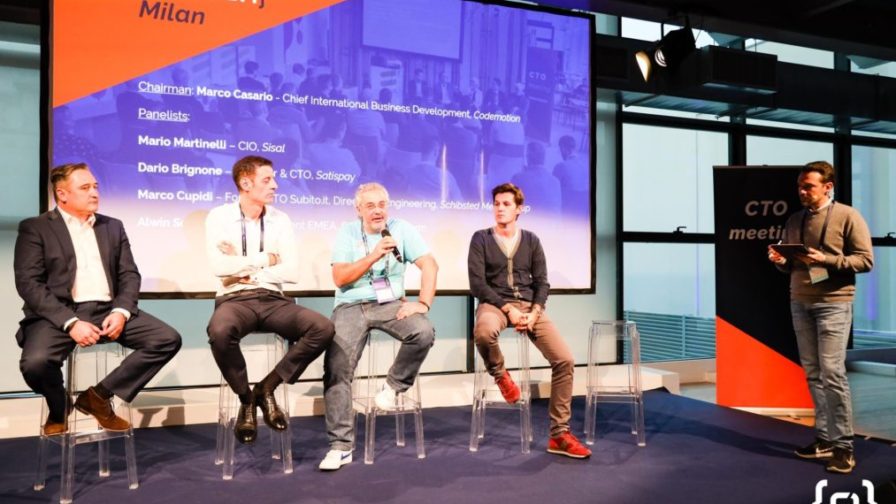
We know that in the real world there are some misconceptions and stereotypes about tech people. We’ve certainly stumbled upon these personally. Are you a web developer? Surely you can fix a misbehaving printer driver. Are you a UX designer? Please, do a beautiful horse charcoal drawing! Are you a CTO? What’s a Chief Technical Officer supposed to do?
In a context in which we often hear talk of the Fourth Industrial Revolution and Digital Transformation, knowing how to recognize the skills and core activities of a CTO / CIO is important to be able to face the new challenges that are to come.
At the Codemotion Milan 2018 conference, various tech leaders had the opportunity to confront this themselves within a networking event specifically tailored to them, the CTO Meeting.
The format, proposed by Codemotion in the previous Milan edition, has been successfully exported to the other European stages of the conference and it is now back in town.
The Digital Transformation of Tech Leaders
Leading the meeting were four exceptional panelists: Alwin Schauer, EMEA vice-president at Salesforce Platform, Mario Martinelli, CIO at Sisal, Dario Brignone, founder and CTO at Satispay, and Marco Cupidi, former CTO at Subito.it and currently Director of Engineering at Schibsted Media Group.
Even if they come from different backgrounds in terms of history, business and technological “depth”, from their words we could understand how, each in their own context, they see and live their role of CTO as a bridge between the product/business teams and technical teams.
Just as digital transformation is changing every aspect of the business, from the way companies deliver services and products to the way they treat customers, the figure of the technical leader is evolving accordingly.
Nowadays, CTOs are asked to be a filter and facilitator among the various and different company individuals. So they must be able to understand and interpret the requests coming from the business, as well as driving the IT crowd towards the most suitable and sustainable technical solutions.
CTOs are asked to be a filter and facilitator among the various and different company individuals.
In the time spent at the CTO Meeting of Codemotion Milan 2018, however, the conversation between the various panellists and the other tech leaders was not focused on purely technological issues. The keywords of the event and the hot topics were, in fact, people, metrics and business.
People Uber Alles
As Alwin Schauer said during the CTO Meeting event, one of the responsibilities of tech leaders it to build up a great environment in which to work at one’s best and most innovative. This challenge translates not only in the ability to choose the most appropriate technological stack for business needs but also in the ability to assemble, drive and grow a technical team made, in the end, by people.
This kind of challenge was experienced by Mario Martinelli in the last three years. The direction required by Sisal, in fact, would have required skills not available internally and, at the same time, it seemed difficult to see how Sisal could actually be an interesting company for tech people too.
All panellists shared the pain about the hiring and retention of talented people, as they shared evidence that tech people are happier to work (and stay) if they can interact with challenging environments.
Another important aspect to consider is the cultural fit; certainly, it is important to hire new people who are congruous with values, beliefs and behaviour within the current organisation, but on one hand, digital transformation is making the concept of corporate culture a moving target, on the other, it makes it difficult to adapt to new behaviours and values for people who have worked in the company for a long time.
Also, for these reasons, it is important that CTOs invest time and resources in the development of “diversity”, not only at the company level, but also at the technical team level, and can offer to their teams plans for personal development.
Metrics, metrics everywhere
The most important question that a CTO must be able to answer, however, is: “Am I doing things right?”.
Although with obvious differences related to the size and scope of their respective businesses, all panelists agreed on the need to have clear and effective metrics. However, it would be misleading to measure the performance of a technical team based on business KPIs – the technical team would always be in trouble.
For this reason, the metrics that can affect a CTO must be distinguished between more strictly business metrics and more technical, infrastructural and organisational metrics.
Marco Cupidi has admitted to being a metric maniac and that, among the many that he keeps under control, the fundamental one for him is the relationship between the time dedicated to planned and unplanned work. This allows him to understand if tech teams are planning and executing in the correct way.
Marco Brignone, for his part, recalled the importance of the level of services and the perceived quality of the product by final customers. From this point of view, direct feedback from users and feedback from customer care departments are crucial for both the business and IT departments.
Tech is the new business
The role and tasks of the CTO are no longer limited to the sole or exclusive implementation of the IT roadmap.
Technology, in the era of Industry 4.0 and digital transformation, is everywhere. Sometimes information technology itself is the business. So the role of the CTO is crucial and closer to the direction of the business.
CTOs must have a vision and establish a mission. In order to do this, they must not only be technical leaders, but they must be able to understand the language of the business – yes, you must learn to read a company balance sheet – and be able to communicate and influence the company strategy.
In the end, it’s simple: build a great technical team you trust and rely on in order to build the best customer experience.



